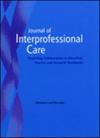病人在临床培训病房的参与体验:定性访谈研究。
IF 1.9
3区 医学
Q3 HEALTH CARE SCIENCES & SERVICES
引用次数: 0
摘要
跨专业教育旨在培养医护学生在跨专业团队中的协作能力,让患者作为积极的参与者成为医疗服务的中心。然而,人们对患者如何体验这种合作却知之甚少。因此,本研究旨在探讨瑞典一家临床培训病房的医护学生参与跨专业团队的患者体验。研究采用了描述性设计和定性方法。通过对 22 名患者进行半结构化个人访谈收集数据。采用了布劳恩和克拉克的反思性主题分析法。主要发现是患者只是作为被动参与者参与其中。虽然大多数患者都希望参与其中,但由于健康状况,他们受到阻碍,或被排除在护理规划和决策之外。病人需要家人的支持才能参与其中。然而,由医学生组成的跨专业团队并没有认识到这一需求。必须强调患者参与是跨专业教育活动的重要组成部分。需要进一步开展研究,探讨家属在跨专业培训病房环境中的参与观点。本文章由计算机程序翻译,如有差异,请以英文原文为准。
Patients' experiences of involvement at a clinical training ward: a qualitative interview study.
Interprofessional education aims to foster healthcare students' ability to collaborate in interprofessional teams with the patients at the center of care as active participants. However, little is known about how patients experience this collaboration. Therefore, this study aimed to explore patients' experiences of being involved in the interprofessional team of healthcare students at a clinical training ward in Sweden. A descriptive design with a qualitative approach was used. Data were collected through semi-structured individual interviews with 22 patients. Braun and Clarke's reflexive thematic analysis was used. The main finding was that patients were only included as passive participants. Although most patients wanted to be involved, they were hindered due to their health condition or excluded from care planning and decision-making. The patients needed family members' support to be involved. However, this need was not recognised by the interprofessional team of healthcare students. Patient involvement must be highlighted as an important component of interprofessional education initiatives. Further research is needed to explore family members' perspectives on involvement in interprofessional training ward settings.
求助全文
通过发布文献求助,成功后即可免费获取论文全文。
去求助
来源期刊

Journal of Interprofessional Care
HEALTH CARE SCIENCES & SERVICES-
CiteScore
5.80
自引率
14.80%
发文量
124
审稿时长
6-12 weeks
期刊介绍:
The Journal of Interprofessional Care disseminates research and new developments in the field of interprofessional education and practice. We welcome contributions containing an explicit interprofessional focus, and involving a range of settings, professions, and fields. Areas of practice covered include primary, community and hospital care, health education and public health, and beyond health and social care into fields such as criminal justice and primary/elementary education. Papers introducing additional interprofessional views, for example, from a community development or environmental design perspective, are welcome. The Journal is disseminated internationally and encourages submissions from around the world.
 求助内容:
求助内容: 应助结果提醒方式:
应助结果提醒方式:


